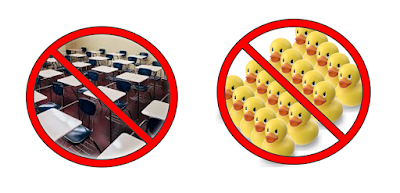An innovation
ecosystem provides contrast to the typical compliance driven educational model,
empowering people to learn, improve, and innovate. For decades, the focus of schools has been
largely on test performance and compliance, particularly in test-centric states
like New York, resulting in many of the troubles experienced with American
schools today.
Innovation cannot
exist without a culture that supports and encourages it. The first, most important cultural factor in
considering innovation in education lies in the support of teachers. Are calculated risks encouraged and valued,
or will educational risks result in ostracism or worse if school and community
politics get heated?
We have been
working for some time in a bureaucratic system that values collective test
scores and performance far more than individual growth and outcomes. In 2001, when I moved to New York, I first
saw a teacher teaching an entire Physics course out of a NY State Regents
Review book. Most other teachers of
Regents level courses included test review periods of at least a month at the
end of courses prior to Regents exams.
As time went on that year, I frequently heard about the “good teachers”
that had 100% pass rates on exams and “ineffective” teachers with lower passing
rates. The focus on passing rates and
compliance for nearly 20 years has secured this district a spot on the downward
slope. My beliefs about education were
too far out of alignment with this district, so I left at the end of that year
for another district- one that still had to comply with state assessments but showed
more value for the individual learner.
A few years later,
an assistant superintendent from a neighboring district came to my school to
discuss student performance review on these tests. She told teachers that our job was to only
teach the content of these tests. Having
had experience in other states, I realized the limitations of the exams. My students in other settings were afforded
richer, more meaningful learning experiences and local colleges frequently gave
my former district positive feedback regarding the preparation of our students
both for laboratory and classroom work. I
raised my hand and asked about content not included on the exams, sharing that when
preparing students for college, we need to be mindful of skills needed at that
next level. I was abruptly cut off by her
comment, “You don’t worry about that.
They’ll get what they need when they get there.”
I’m not easily
angered, but for the first and only time in my life I walked out of what was
supposed to be professional development training fuming. I’ve always cared more about the individuals
in my charge than about the tests and the data.
While I wholeheartedly agree that data has value in evaluating our
progress and in assessing needs and growth of students, it should never be the
sole driver of our actions in education.
I also don’t believe that a single test should ever be our end
goal! This notion is just preposterous!
Educator training
such as described above, administrative policies, and school cultures that are
test-centric, have driven the heart and soul out of our schools. Our schools need to be places where the
individual matters and the success of those individuals must be at the heart of
what we do. Success must also be thought
of in a broad sense in schools, with consideration of the unique needs and
paths of each child. To be truly
innovative, we need to look beyond prescribed tests to student interest and
passion, giving students voice and choice, ultimately empowering students to be
drivers of their own education, facilitated by skilled educators who believe in
them.
For
our schools to be innovation ecosystems, change is needed.
1.
Cultural
change from test driven a student driven/”learner obsessed”
2.
Focus Change from
siloed a collaborative
partnerships with businesses and the community
3.
Leadership Change
from traditional authoritarian a collaborative lead learner, supporting teacher development
and student learning
4.
Evaluation change
from hyper focus on test outcomes a broader view of student impact
5.
Instructional change
from direct explicit standards driven, traditional a students meeting standards along a teacher
facilitated path filled with inquiry, exploration, experimentation, and
discovery
6.
Learning Change
from what is delivered/provided to the individual a individuals actively
seek opportunities for personal growth (This
applies to students and staff!)
7.
Expectations change
from compliance a empowerment, where staff and students work together, maintaining a
positive, growth-focused school culture
Martin, Katie, Learner-Centered Innovation: Spark Curiosity, Ignite Passion, and Unleash Genius (San Diego, CA: Dave Burgess Consulting, Inc. 2018).

